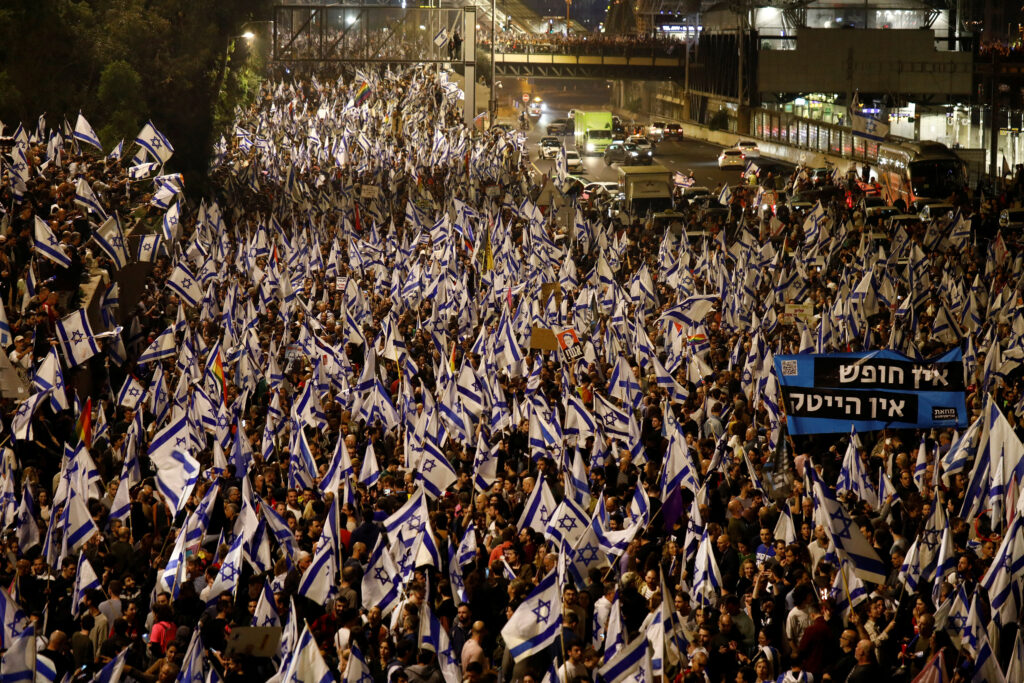By Satyaki Chakraborty
Massive global protests in the last four days of September in all the major cities of the world including New York, Washington, London, Paris, Berlin and finally Tel Aviv against Israel Prime Minister Benjamin Netanyahu’s rigid attitude to the ceasefire proposal to end the Gaza war, have led to some positive reaction among the leaders of the western nations
British Prime Minister Keir Starmer has just announced his decision to block 30 arms export licences for weapons due to go to Israel. The decision is a small step as the blocking affects only 10 per cent of the licences but still it is a good beginning and this has been possible due to the continuous pressure put by the British peace movement and the left wing of the ruling Labour Party who have been active all through in protesting against the arms assistance being given by the British government to Israel.
Simultaneously, President Joe Biden has publicly admonished his friend Netanyahu by saying that the Israeli Prime Minister should give up his rigid position on ceasefire proposal to end Gaza war. Israeli military leaders have immediately reacted by saying why Biden is not saying the same to Hamas leaders?. But the fact is that US secretary of state Antony Blinken has already communicated to the Hamas leadership through his interlocutors that this is the last chance and Hamas should see to it that this proposal is approved.
President Biden’s latest hard stance to the Israeli Prime Minister is also due to the impact of massive anti war demonstrations in major US cities and the strong position taken by the leftwing Democratic congress members on the US position on Israel. The Democratic Party is also feeling that the votes of the pro-Palestine elements of the US voters will be needed for its candidate Kamala Harris to win against Donald Trump. With only two months away from Presidential elections, President Biden is also making efforts to ensure the agreement on a ceasefire proposal as a trophy for the Democratic Party before the November 5 elections. That is why, there is some hardening of stance to Israel.
As regards British Labour Party PM Starmer, Labour is feeling the heat from the streets — and the polling booths. The sustained mass movement of solidarity with the Palestinian people unavoidably vented much of its anger at Starmer’s full-throated endorsement of Israel’s genocidal conduct earlier…And that impacted powerfully in the general election. Labour lost votes over the issue, particularly among Muslim communities which have largely supported the party in the past. It lost four seats and came close to losing several more as a consequence. Wes Streeting and Shabana Mahmood are two cabinet members who will be worried about their political careers if the government continues to support Netanyahu.
In the recent days, Starmer has finetuned his earlier position. The government has restored funding to refugee agency UNRWA. The government also dropped objections to the International Criminal Court seeking arrest warrants for Israeli Prime Minister Netanyahu and Defence Minister Gallant, on legalistic rather than political grounds. But the arms supplies are continuing. The anti war movement in Britain is now demanding total stoppage of arms supply to Israel and compelling Israel to agree to the ceasefire proposal. for working on a political solution.
The pressure on the Prime Minister Benjamin Netanyahu was most severe on Sunday and Monday as huge demonstrations were held by Israeli citizens in Tel Aviv and other cities..Called by Arnon Bar-David, chairman of Histradut—the General Federation of Labour, Israel’s main trade union alliance—the strike was aimed at protesting against Prime Minister Benjamin Netanyahu’s refusal to conclude a ceasefire in his war on Gaza and his government’s failure to secure the release of hostages still held by Hamas.
Monday’s strike paralyzed the country’s main airport and shut down schools, ports, airlines, banks, the electric company, the post office, many government departments, bus companies, several municipal services, trains, and universities.
The strike came on the heels of mass protests on Sunday which saw as many as 500,000 Israelis pour into the streets of every major city and town to express grief and anger after six hostages were found dead in Gaza.
Information released by the Israeli National Forensic Institute revealed that its examination of the bodies showed the six had been shot at close range 48 to 72 hours before their discovery. At least three of them were supposedly scheduled for release as part of the first phase of a ceasefire deal currently being negotiated.
UN sources say that the Israeli government’s war has turned Gaza to ruins since October and killed at least 40,819 Palestinians and wounded 94,291. Both these numbers are believed to be major undercounts, though, due to the large number of people still missing beneath the rubble or whose remains have been destroyed by the Israeli military..The peaceniks in Israel are determined that they will continue their movement till the ceasefire deal is concluded. (IPA Service)




 Narendra Modi Government And Farmers Are Still Poles Apart
Narendra Modi Government And Farmers Are Still Poles Apart 